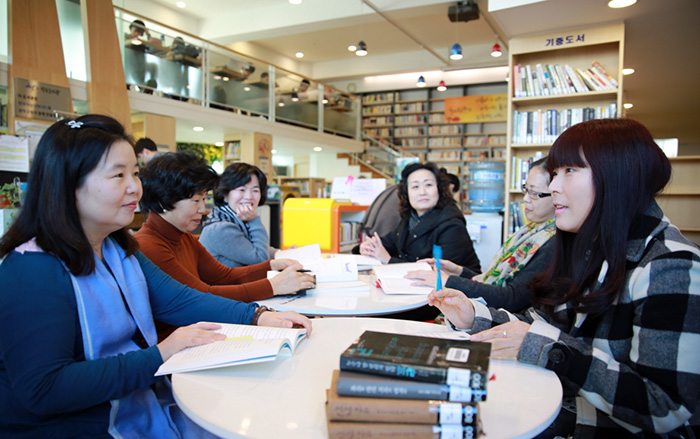View this article in another language
- 한국어
- English
- 日本語
- 中文
- العربية
- Español
- Français
- Deutsch
- Pусский
- Tiếng Việt
- Indonesian

Among Seoul's 25 districts, Gwanak-gu has one of the most vigorous networks of book clubs, thanks to the district government’s financial support for books, libraries and reading.
“Why don’t we visit Chuncheon next month and see the setting of Kim Yu-jeong’s (김유정, 1908-1937) novel ’Dongbaekggot’ (동백꽃)?”
“’Unrequited love’ is the keyword of ‘Dongbaekggot!’ Although the expression of such feelings is rather radical and blunt, they are delightfully humorous.”
In one corner of the Having a Lucky Dream Library, one of Gwanak-gu District’s small libraries, a group of housewives talking about books -- juchaek-i (주책이) in Korean -- continues its conversation on March 14. Fragrant tea and refreshments add some spice to their care-free time together.
When the book club started in 2011, they were just parents of elementary school students who wanted to understand their kids better through reading. However, as time went by, they realized they were the ones that could create change. The club’s 14 members hold monthly meetings. They read books from various fields and talk about them together to make themselves better people.
Gwanak-gu calls itself a “Town of Libraries.” Since it started registering local book clubs in November 2014, more than 300 clubs signed up. Gwanak-gu District is home to about 30 percent of the 1,006 official book clubs in all of Seoul, and yet it only makes up 5.1 percent of the capital's total population.
Gwanak-gu financially supports book clubs with more than five members that meet more often than once per month. So far, 255 book clubs benefit from the aid. For efficient management of the book clubs, the district office provides information about how to run a club, how to balance their accounts and how to lead discussion groups. Book clubs registered in Gwanak-gu can also use 17 meeting rooms and receive regular consultations. Book club organizers can sign up for leadership training for clubs and how to run book discussion sessions.
Starting in 2017, the book clubs will be sorted into three types of clubs: public institutions, parents and general adults. The district hopes that this will connect the clubs and create a more dynamic exchange of knowledge.
In addition to supporting book clubs, the district runs various campaigns to encourage its residents to read more, such as Bookstart, which provides picture books to children who just started reading, Living Library, which allows people to meet experts in certain fields, its “Living Books” series, and Biography for Seniors, which gives financial support to elders over the age of 65 who write a book about their life story.
District Mayor Yu Jong-pil has pledged to invest in the future of Gwanak-gu residents and to build a "district of the humanities." Ever since he took office, the number of small libraries has increased to 43. Before that, there were just five. Library-goers increased more than twofold, from 70,000 to 160,000. The growth was not just quantitative, but also qualitative.
“The 300 book clubs are the most valuable asset in Gwanak-gu,” said District Mayor Yu Jong-pil. "The credit for making Gwanak-gu a 'district of the humanities' goes to the residents.”
By Wi Tack-whan, Kim Young Shin
Korea.net Staff Writers
Photo: Gwanak-gu District Office
whan23@korea.kr